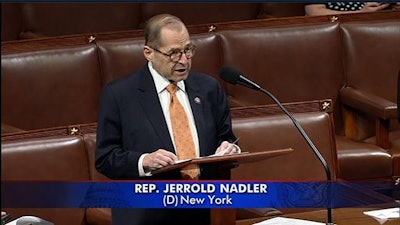
U.S. House lawmakers passed federal legislation to remove cannabis from the Controlled Substances Act on April 1, marking the second time broad reform has received majority support in the chamber.
In addition to ending the federal prohibition of cannabis, the Marijuana Opportunity Reinvestment and Expungement (MORE) Act would provide expungements for those with cannabis offenses and impose a federal tax on cannabis to fund programs for those adversely affected by the drug war.
House members voted, 220-204, almost entirely along party lines, to pass the bill.
Sponsored by U.S. House Judiciary Committee Chairman Jerry Nadler, D-N.Y., the legislation, House Bill 3617, was first introduced in July 2019 and was passed by the full lower chamber via a 228-164 vote in December 2020.
In his opening remarks Friday on the House floor, Nadler said legislation to reverse decades of failed federal policies based on the criminalization of cannabis is long overdue. He also pointed out that 37 states have legalized medical cannabis, while 18 states and Washington, D.C., have legalized adult-use cannabis.
“It is long past time for the federal government to recognize that legalization has been a resounding success, that the conflict with federal law has become untenable,” he said. “Criminal penalties for marijuana offenses and the resulting collateral consequences are unjust and harmful to our society. The MORE Act comprehensively addresses these injustices.”
More specifically, Nadler said the MORE Act has three main focuses:
- remove cannabis from the list of federally controlled substances;
- authorize the provision of resources funded by the federal tax of cannabis sales (starting at 5% and increasing to 8% by the fifth year of implementation) to address the needs of communities that have been “seriously” impacted by federal prohibition policies, including increasing the participation of communities of color in the burgeoning cannabis market; and
- provide the expungement of federal cannabis convictions and arrests.
Rep. Cliff Bentz, R-Ore., who also controlled the floor for Friday morning’s debate, said that while U.S. House members considered cannabis legislation, there were more important issues at hand.
“There’s a war raging in Ukraine, killing thousands and thousands of innocent people,” he said. “Gasoline, diesel, grocery prices are through the roof. For all practical purposes, we don’t have a southern border anymore. So, hundreds of thousands of immigrants continue to flood into the United States, and the situation there is about to get much worse.
“Ramped inflation is making short work of the hard-earned money of all Americans. The main priority for the Democrats this week isn’t Ukraine, skyrocketed gasoline prices, 8% inflation or the border crisis. No, instead, it’s marijuana.”
Bentz also took issue with the tax revenue allocations, specifically calling out the lack of local police funding.
“If this 8 percent tax had been applied to the amount of marijuana sold in the United States, the total is $400 million,” he said. “Not the total sold—the total tax.”
According to the bill, 60% of federal tax revenue on cannabis sales would go to the U.S. Attorney General’s office to carry out portions of the Omnibus Crime Control and Safe Streets Act of 1968. The other 40% would go to the Small Business Administration to carry out the MORE Act’s equitable licensing grant program.
Similarly, Rep. Steven Palazzo, R-Miss., questioned why the House took time to focus on cannabis amid other national issues.
“Our country is facing a national security crisis, an energy crisis, a border crisis, and an economic crisis, but here we are voting on cannabis legislation,” said Palazzo, who questioned how the bill would help address those issues and others facing the country. “Simple answer: It doesn’t. We are here today to vote to get America high.”
Palazzo cited concerns with a rise in emergency room visits in states that have already legalized cannabis. He also noted cannabis addiction, especially among children, as a main reason for opposing the bill, citing a JAMA Psychiatry study that found a 25% increase in cannabis use disorder (CUD) in Colorado among children aged 12-17.
“Allowing children who don’t know how to rationalize long-term effects of drugs to use a gateway drug for recreational or medicinal purposes is reckless, negligent, careless and irresponsible,” Palazzo said, adding that passage of the bill would only “poison our children and weaken our society.”
U.S. House Majority Leader Steny Hoyer, D-Md., on the other hand, applauded the bill—and took his colleagues to task for shooting down the very concept of cannabis legalization.
“This is an important piece of legislation. How do I know that? Because the people have told us that. Every time they’ve had the opportunity to vote in America, they have voted to do this,” he said on the floor. “And I want to tell my colleagues I’m tired of hearing this argument—that, ‘Oh my goodness, we’re doing this, we ought to be doing something else!’ We are all working on the issues of great concern, not only to us but to the global community.”
The continued push for broad cannabis reform comes at a time when 68% of Americans support full legalization, according to a November Gallup Poll; 91% of U.S. adults support federal legalization of medical cannabis, according to an April 2021 Pew Research Center survey; and an estimated 40,000 people remained incarcerated for cannabis offenses in the U.S., according to Forbes.
“For some in this House, those who are treated with inequality, particularly in this area, [legislators seem to be saying,] ‘You’re on your own. Make it out for yourself. We’re not going to address it. Because we have other issues.’ Of course we have other issues!” Hoyer said. “And we pass bills on those, unfortunately without much support from the other side of the aisle. Despite the changes in state laws and social norms around the usage of marijuana, its use remains illegal under federal law, often resulting in devastating consequences. Hear me, my colleagues: devastating consequences for Black, Latino and Native communities.
“This is an important, fair piece of legislation—fair for the American people.”
Rep. David N. Cicilline, D-R.I., also expressed his support for the legislation, arguing that the current system simply “does not work.”
“It doesn’t make any sense,” he said of prohibition. “Not for community safety, not for the functioning of an effective prison system, and not for successful rehabilitation. By removing marijuana from the federal controlled substances list, allowing for the expungement of marijuana offenses, and providing support to communities most impacted by the failed war on drugs, the MORE Act is a long, overdue step in restoring justice and reversing the harms caused by the war on drugs.”
In addition to floor debate on the underlying bill, House members also considered three amendments:
- An amendment from Rep. Josh Gottheimer, D-N.J., authorizes $10 million for the National Highway Traffic Safety Administration to conduct a study on technologies and methods that law enforcement may use to determine whether a driver is impaired by cannabis.
- An amendment from Rep. Conor Lamb, D-Pa., directs the National Institute for Occupational Safety and Health (NIOSH) to conduct a study on the impact of legalization to the workplace, using states that have legalized recreational use of cannabis as a guide, and requires NIOSH to develop best practices for employers as companies transition their policies related to cannabis, prioritizing employers engaged in federal infrastructure projects, transportation, public safety and national security. The amendment also aims to direct the Department of Education to conduct a study on the impact of legalization to schools and school-aged children, using states that have legalized adult-use cannabis as a guide, and requires the Department of Education to develop best practices for educators and administrators to protect children from any negative impacts.
- An amendment from Rep. Jamie Raskin, D-Md., states that cannabis use shall not be the reason for denying or rescinding a security clearance.
The Gottheimer and Lamb amendments were adopted by the full lower body, while the Raskin amendment failed.
The MORE Act now heads to the Senate, where the previous version of the bill stalled in 2020 with then-Majority Leader Mitch McConnell, R-Ky., in the driver’s seat.
There are two other high-profile legislative efforts aimed at broad federal cannabis reform this Congress.
Rep. Nancy Mace, R-S.C., introduced the States Reform Act (SRA) in November. Her bill offers a path to reform that includes a 3% federal cannabis excise tax and provides state governments the power to regulate cannabis products through the health-and-safety oversights of their choosing, while authorizing the Alcohol and Tobacco Tax and Trade Bureau (TTB) to oversee cannabis products in interstate commerce.
The Cannabis Administration and Opportunity Act (CAOA), sponsored by Senate Majority Leader Chuck Schumer, D-N.Y., and colleagues Ron Wyden, D-Ore., and Cory Booker, D-N.J., is lined up for a formal introduction later this month.
Schumer and his fellow CAOA sponsors have indicated they first want to push a vote on their measure before considering incremental reform.
Associate Editor Tony Lange, Senior Digital Editor Melissa Schiller, Editor Theresa Bennett, Associate Editor Andriana Ruscitto and Digital Editor Eric Sandy contributed to this report.


























